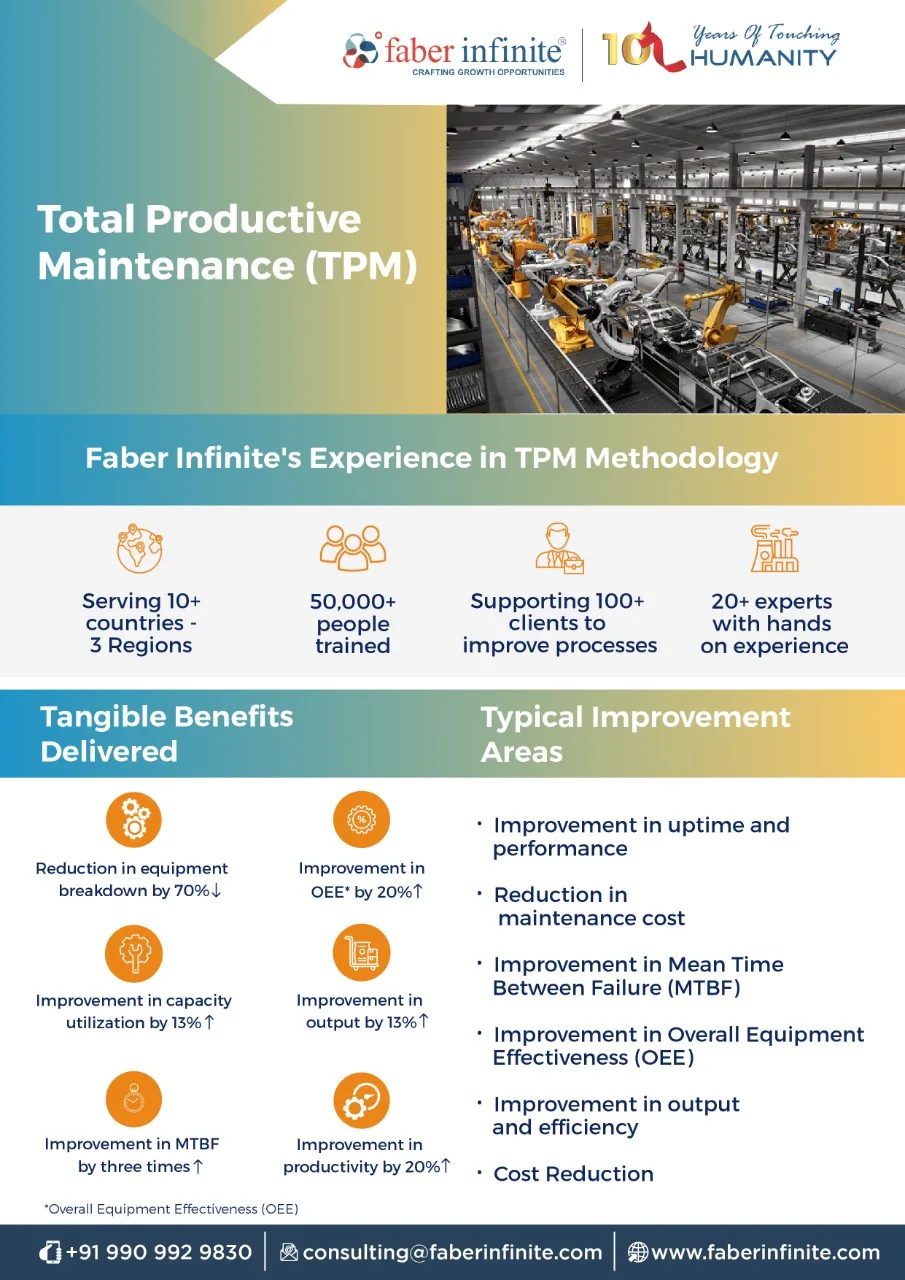Faber Infinite specialises in Organizational Transformation, Operational Excellence, and Business Excellence. Manufacturing organisations should strive for basic stability of the 4Ms – Man, Method, Material, and Machine – to progress toward excellence. In this article, we will talk about How can TPM (Total Productive Maintenance) help Build Efficient and Profitability? and Key points of TPM.
It is a well-known fact that equipment/machine maintenance can be improved by implementing TPM (Total Productive Maintenance) methodology, which can lead the organisation to the goal of continuous improvement. One of our esteemed clients in Gujarat, India, was experiencing equipment performance issues that were impeding the organization’s continuous improvement journey. As a result, the client team, in collaboration with team Faber Infinite, implemented Autonomous Maintenance, one of the pillars of the TPM framework, to improve the operational excellence journey and build culture of continuous improvement on the shop floor.
Key point of Total Productive Maintenance
TPM is a globally accepted and proven Japanese framework. The Japanese Institute of Plant Maintenance introduced preventive maintenance in Japan in 1951, which is when TPM got its start (JIPM). TPM framework entails a well-defined concept for maintaining plants and equipment. The TPM program’s goal is to significantly boost output while also improving employee morale and job satisfaction. By reducing errors and accidents, this method improves existing processes and equipment. TPM is divided into eight pillars, each of which focuses on proactive and preventative techniques for increasing equipment reliability and stability.
When businesses begin to implement TPM, they frequently begin by experimenting with Autonomous Maintenance (AM). This is understandable given that one of TPM’s key distinguishing features is autonomous maintenance. The second of TPM’s eight pillars is autonomous maintenance. In Japanese, it is also known as JISHU HOZEN. It takes a systematic approach to increasing personnel skill levels so that they can understand, manage, and improve their equipment and processes. The main goal is to shift operators from a reactive to a proactive mindset to achieve optimal conditions that eliminate minor equipment stops while also reducing defects and breakdowns.
TPM is one of the key frameworks that stands between the success and failure of equipment/machine/asset management for any organisation on its journey of continuous improvement today, with industry competition at an all-time high.
Total Productive Maintenance in Manufacturing Industry
Faber Infinite has been working with one of the leading automobile component manufacturing companies for the past year and has consistently delivered excellent results. Team Faber joined the organisation and assisted it in pushing up the success numbers and objectifying the operating environment for optimal results.
We recognise that TPM and its pillars have added value to organisations by striving for zero defects, zero accidents, and zero breakdowns. With TPM, we were able to assist the client in achieving tremendous results in a short period of time. The results have been so positive that the client, who has been using TPM for over a decade, has exceeded its own expectations in such a short period of time.
While achieving this level of excellence, we also assisted the client in developing a Manufacturing Excellence Roadmap for the next three years, as well as in various other aspects of manufacturing such as inventory management, manpower productivity, and so on.
Typical results delivered for the client are:
- Over the course of a year, we assisted the client in increasing throughput time by more than 23%.
- As a result of Team Faber Infinite’s efforts, inventory was reduced by approximately 33%.
- Following the involvement of the Faber Infinite Consulting team, manpower productivity increased by more than 19%.
- The order rejection rate was also reduced by more than 12%.
Contact us to build more efficient and profitable organizations with TPM. To read more click on the links below:
- https://faberinfinite.com/3-key-themes-for-future-growth-and-development/
- https://faberinfinite.com/improve-equipment-performance-via-autonomous-maintenance-tpm/
Written & Compiled by Faber Mayuri & Faber Aleena

Image Source – Freepik.com




